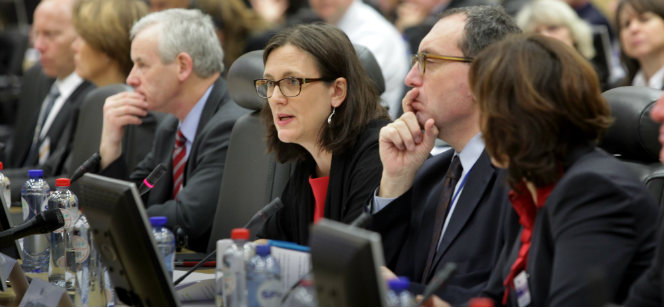


Accessibility tools
Service tools
Language selector
Navigation path
Left navigation
Additional tools
28 January 2013

How to sharpen Europe's tools to prevent violent extremism? A conference in Brussels on 28 and 29 January aims to give the answers to these questions, based on the work carried out by experts and practitioners in the Radicalisation Awareness Network (RAN), launched by EU Commissioner for Home Affairs Cecilia Malmström.
Policy proposals ![]() include training local police to detect signs of radicalisation into violent extremism, and providing de-radicalisation or exit programs for members of extremist groups. By bringing together field workers with ministers, academia and local authorities, the conference aims to take the EU's work against extremism to a new level.
include training local police to detect signs of radicalisation into violent extremism, and providing de-radicalisation or exit programs for members of extremist groups. By bringing together field workers with ministers, academia and local authorities, the conference aims to take the EU's work against extremism to a new level.
"Violent extremism represents a big threat to EU citizens' security. The terrorist threat has in part shifted away from organised groups to individuals, who are harder to detect, and whose actions are harder to predict. A lot can be learnt from front line professionals and their recommendations provide important tools and concrete suggestions for policy makers," said Commissioner Cecilia Malmström.
"We will not defeat violent extremism without also addressing the populist and demagogic propaganda which lays the ground for ideologically motivated violence in Europe," added Commissioner Malmström. "Not since World War II have extremist and populist forces had so much influence on national parliaments as they have today. We need more European leaders to express their opposition to rising extremism. We must have the courage to stand up and protect our common European values".
The people best placed to tackle the phenomenon of violent extremism are those in direct contact with vulnerable individuals or groups. All over Europe there are field workers, researchers, teachers and community leaders who are trying to identify and help individuals who are at risk of becoming radicalized and committing violent acts. At the high-level conference, these field workers join forces with the interior or justice ministers of Belgium, Cyprus, France, Ireland, Italy, Latvia, Norway and Sweden, as well as representatives from a range of other countries.
The 15 proposals being discussed at the conference also include helping victims of terrorism sharing their stories as a power tool for prevention; engaging former extremists to deconstruct violent extremist narratives and using resources from public-relations companies and film industry in developing counter-narratives and help promoting effective alternative messages online.
Recognizing that radicalisation can be best contained at a level closest to the vulnerable individuals in the most affected communities, the Commission launched in September 2011 the EU Radicalisation Awareness Network – RAN. It supports first-line local practitioners involved in countering violent extremism across the EU, and facilitates the exchange of experiences and best practices amongst them.
The discussion paper, with proposals for 15 concrete actions in the field, as well as the working papers of the groups, are available online. Questions & answers and Cecilia Malmström's press confererence are also available, as well as pictures for download.